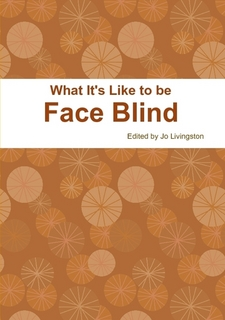‘What It’s Like to be Face Blind’

In 2012 Jo Livingston, one of the Directors of Face Blind UK, set out to gather the lived experience of individuals diagnosed with prosopagnosia. Some stories are funny, some quite poignant, but together they bring a neurological condition to life and place it in a personal and social context.
Prosopagnosia is a difficult condition to convey to other people, because recognising faces is such an automatic skill for most people. One of the best ways of explaining what it’s like is through examples drawn from everyday life. The chapters cover all aspects of living with face blindness, from Discovery and the decision To Tell or Not to Tell, through to Work, Children, Family, and Fear and Guilt.
We believe that this is a valuable resource for everyone interested in this condition, whether student or researcher, family or friends, as well as helping those of us with a diagnosis to know that we are not alone!
“In the past I always believed I failed to recognise people because I was insensitive, inattentive, lazy, self-obsessed and stupid. Being diagnosed has therefore been emotional yet amazingly liberating”.
“I remember my sister by her hair, height and dress. When I am waiting for her outside in the street, I see her everywhere, and am sometimes so convinced I wave, and it’s not her”.
“Walking in the woods I met a woman who asked if I’d seen her dog. Not recognising her I asked what kind of dog. Rather surprised, she said an Akito (very recognisable and one that my dog often plays with). I think I covered the fact that I didn’t know who she was but she no doubt went off believing that I couldn’t recognise dogs!”
You can order “What it’s like to be Face Blind” via the website for Lulu Publishers.
